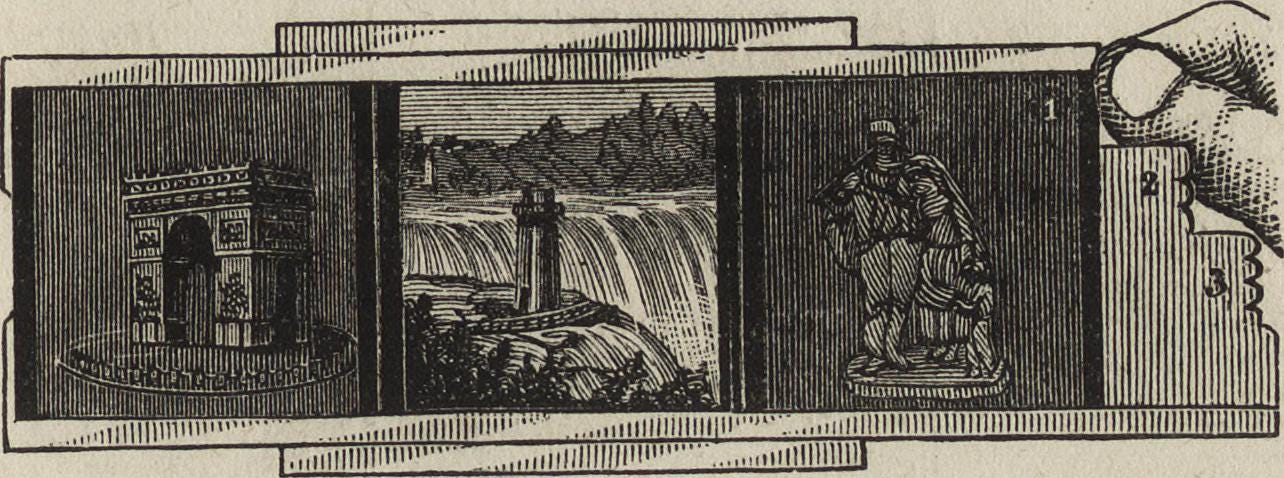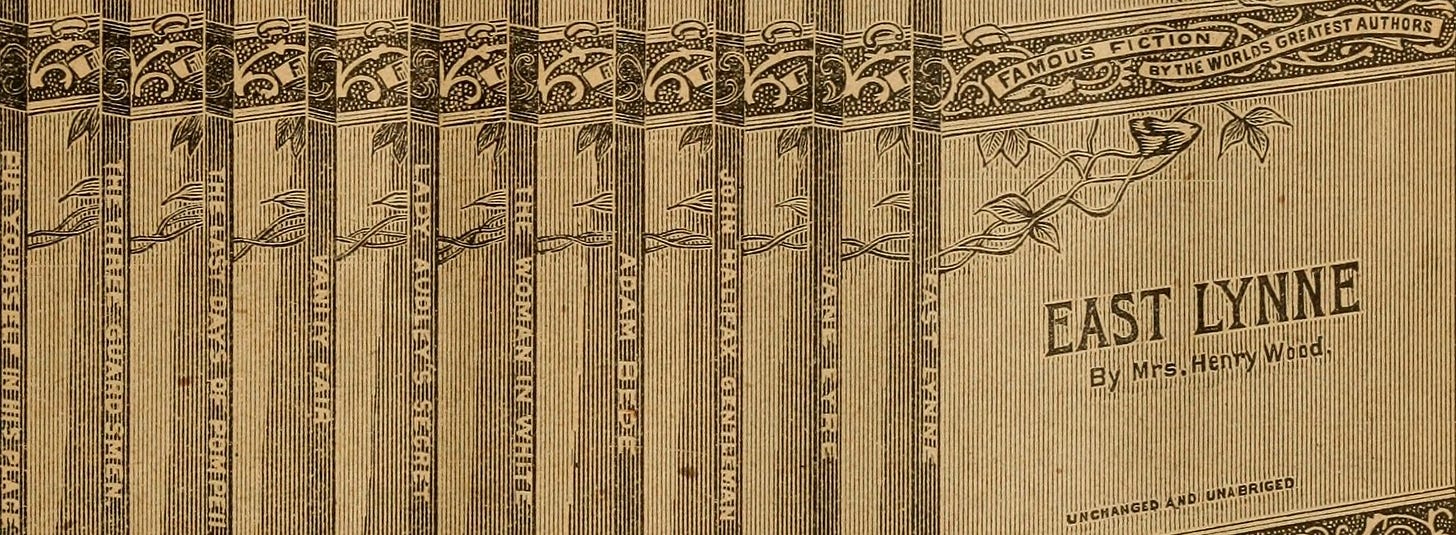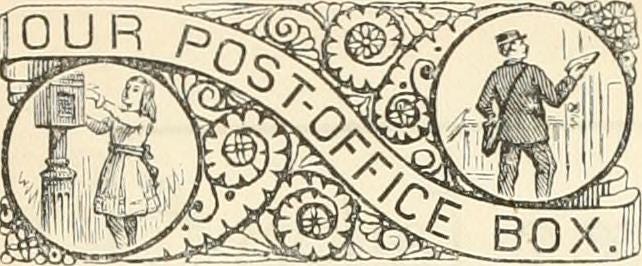Desk Notes No.11
Signs of Spring; Lynnette Yiadom-Boakye; and Somerset Maugham’s unlikable women
Dear friends,
The perennial garden is a bleak aspect in Winter. From the October moment its lush foliage begins dying back, the landscape transitions to a dull, flat brown. I haven’t space for many evergreen, architectural shrubs and trees. That is, I haven’t space without sacrificing cherished spring and summer flowers. I decide to live with the desolation.
The year’s snowdrops have announced the end of my fast. A cluster beside the greenhouse, just visible from the kitchen window, give me reason to hope. Earlier this month, I travelled to Calke Abbey, where an impressive plant theatre showcases over 30 varieties. There are closed drops and open lanterns; delicate white lampshades tipped with green, like the variety Art Nouveau. There are those suspended from egg yolk ovaries, like Primrose Walberg; those with puffy, softly textured petals, like John Long; and those thin, like the wings of insects, the aptly named Wasp.
Growing low on the damp woodland floor, the tiny, humble snowdrop has a secret. Its fragile outer petals conceal another, private layer. Sitting on the tiers of Calke’s theatre, Lady Beatrix Stanley reveals the full ruffles of her petticoat, a voluminous succession of white and green silk. Meanwhile, Green Fields shelter hay yellow nectar, the delicious food of bees, advertised to best effect by stripes of grass. Each pot is a treasure telling me Spring won’t be long.
In this edition of Desk Notes you’ll find:
Pictures - Fly in League with the Night, Lynette Yiadom-Boakye at Tate Britain
Print - The Painted Veil by Somerset Maugham, 1925
Pictures
Fly in League with The Night, Lynette Yiadom-Boakye at Tate Britain until 26 February 2023
A few months ago, I wrote about Moyra Davey’s essay collection Index Cards. I often find myself thinking about her essay, Notes on Photography and Accident and the connections she draws between words and pictures:
“There is a seduction to the editorial use of photographs: surround almost any image with type and it takes on an allure, an authority, provokes a desire it might otherwise not have. What is this appeal, exactly? The seduction of language, of the symbolic? Is it that, as Benjamin and Brecht speculated, photographs are more at home with, even in need of, words?
In one of the grad programs where I teach, students are required to write a thesis about their work and process. I notice that their photographs become vastly more interesting to me after I read what they’ve written about them; I like seeing their images shrunken and decontextualised, embedded in paragraphs of descriptive text.”
In direct contrast, Fly in League with the Night - the first major exhibition of portraits by Lynette Yiadom-Boakye - detaches art from text. There are no explanatory panels, no gallery notes. Like Davey, whose work spans film, photography and prose, Yiadom-Boakye is both artist and poet. The brief exhibition pamphlet explains how, “For her, the two forms of creativity are separate but intertwined. “I write about the things I can’t paint and paint the things I can’t write about,” she has said.” Her subjects are fictitious; people drawn from her imagination using diverse source material including found images and literature. Words inform her paintings, but they do not constrain it.
“I work from scrapbooks, I work from images I collect, I work from life a little bit, I seek out the imagery I need. I take photos. All of that is then composed on the canvas. This lets me really think through the painting, to allow these to be paintings in the most physical sense, and build a language that didn’t feel as if I was trying to take something out of life and translate it into painting, but that actually allowed the paint to do the talking.”
There’s a purity to Yiadom-Boakye’s approach that’s extremely appealing. “There are so many things I do or think about when painting that I can’t put into words,” she says. “Any attempt at explanation can become, at best, superfluous. At worst wholly inaccurate.” The only text appearing within the gallery space are poetic titles accompanying each portrait. The absence of words creates an entirely different gallery experience; one that requires more time, more investment from the viewer. A sense of being unmoored quickly transforms into a feeling of freedom.
The portraits have the texture of a story whose omissions are filled by their onlookers. And the titles often draw attention to the multiplicity of meanings we create. A portrait, titled First, has erotic connotations. It shows a confident man in underwear and a red dressing gown, teasing the fastener between his fingers. Who is he gazing at so intently? Are they on the cusp of their ‘first time?’ Yet again, there may be nothing more to this cryptic title than an allusion to its place in Yiadom-Boakye’s catalogue; being part of her graduation show at the Royal Academy in 2003.
A favourite picture of mine is To Improvise A Mountain. We see a girl from behind, hand on her head; an exasperated, thinking pose. She’s facing a woman who’s lying down, propping up her head with her hands in a kind of symmetry, listening. The girl’s mother perhaps? The picture is overflowing with energy and story. What excuses is the girl fabricating? What is she making excuses for? Has she stayed out too late? Where? And why? We pour ourselves into the ellipses. We fill the story with ourselves. And we become part of the picture.
We do this with all art, all literature, all stories in whatever form they appear. But Yiadom-Boakye makes the process explicit, in a way that’s impossible to avoid and even more rewarding.
Print
The Painted Veil by Somerset Maugham, first published in 1925
“When they were living amid these scenes of horror and desolation, it seemed inept to attach importance to the ridiculous act of fornication.”
I haven’t read a novel this confusing for a long time. The plot’s straight as a poker. But morally and ethically the book is a maze. It was first published in 1925 and yet its contagion threads sound timely - a bacteriologist discovers his wife’s affair and enacts vengeance by forcing her to travel to mainland China where a cholera epidemic rages. Surrounded by death, wife Kitty feels her mistakes are trivial, so why won’t husband Walter agree?
The problem is, Kitty is self-absorbed. In perpetuity. No amount of death, or fear of death, alters her. She’s messy and flawed. She lacks empathy for a man she never loved; a man she married out of a shallow desire to beat her younger sister down the aisle:
“It wouldn’t be very nice to be a bridesmaid at Doris’s wedding. She would be glad to escape that. And then Doris as a married woman and herself single! Every one knew how young Doris was and it would make her seem older. It would put her on the shelf. It wouldn’t be a very good marriage for her, but it was a marriage.”
There’s social commentary here about the pressure upon women to make good marriages; the impossibility of singledom; unmarried women becoming burdens on their families. It’s all very Austen-esque. The book appears to promote sexual liberation, attacking negative attitudes to female sexuality that keep women subjugated:
“She had hesitated some time before the final step, not because she did not want to yield to Charlie’s passion, her own was equal to his, but because her upbringing and all the conventions of her life intimidated her. She was amazed afterwards (and the final act was due to accident; neither of them had seen the opportunity till it was face to face with them) to discover that she felt in no way different from what she had before. She had expected that it would cause some, she hardly knew what, fantastic change in her so that she would feel like somebody else; and when she had a chance to look at herself in the glass she was bewildered to see the same woman she had seen the day before.”
Maugham was a child of the Victorian era and so his eagerness to dismantle its flawed ideas about female virtue - here and in novels like Liza of Lambeth - is extraordinary. What’s most interesting - most infuriating - about this novel is the faulty logic these ideas lead to when placed in the mind of a selfish protagonist. Kitty uses the lack of any “fantastic change” in herself as evidence for why her actions don’t matter. She detaches the adulterous act from all its accompanying emotions (love, trust, respect) and, in doing so, effectively erases Walter’s experience. He is a broken man.
“It was like making a blunder at a party; there was nothing to do about it, it was dreadfully mortifying, but it showed a lack of sense to ascribe too much importance to it.”
“It was a pity he had so little sense of humour: she could see them both some day, laughing together at the way they had tormented themselves.”
I’m still not entirely sure whose side Maugham thinks we should be on. It’s Kitty’s perspective we’re privy to, but it doesn’t necessarily mean we should root for her. I find myself wondering if we might more easily accept these statements - these demands for forgiveness - had they been spoken by a man. And whether provoking this train of thought might have been part of Maugham’s grand scheme.
The debate about unlikeable female characters has been intensifying in recent years; particularly, why ‘likability’ seems to matter more in the case of female protagonists. In a recent article for The Guardian, Xan Brooks asks whether the poor box-office performance of Oscars film, Tár, is due to putting, “an unlikeable woman,” in the lead. In making the case for unlikeable women characters, Brooks explores the fascinating complexity of real life people, quoting Maugham himself: “The longer I know people, the more they puzzle me. My oldest friends are just those of whom I can say that I don’t know the first thing about them.” Perhaps we were never supposed to like Kitty in the first place. She’s shallow, frivolous, self-seeking, lacks restraint. But the real problem at the heart of the novel is marriage itself.
From its first moments, The Painted Veil, establishes marriage - marriages of convenience - as a danger to both women and men. A sentiment likely amplified by Maugham’s personal situation (an unhappy marriage to Syrie Wellcome ended in divorce in the late 1920s). Kitty’s father is bled dry by his family:
“His daughters had never looked upon him as anything but a source of income; it had always seemed perfectly natural that he should lead a dog’s life in order to provide them with board and lodging, clothes, holiday and money for odds and ends; and now, understanding that through his fault money was less plentiful, the indifference they had felt for him was tinged with an exasperated contempt. It never occurred to them to ask themselves what were the feelings of the subdued little man who went out early in the morning and came home at night only in time to dress for dinner. He was a stranger to them, but because he was their father they took it for granted that he should love and cherish them.”
Kitty’s only serious attempt at redemption, is motivated by the injustices inflicted on her father. In China, a temporary spiritual awakening is ushered in when she catches, “a glimpse of a world rich with a colour and significance she had not dreamt of.” But it is a superficial transformation underscored - to modern readers at least - by the novel’s lens of empire and racial prejudice. The working-class locals are denigrated and the wealthy exoticised. Neither are presented as entirely human; the aristocratic Manchu who inspires Kitty’s fantasy of existence on, “a different plane,” is portrayed as a, “phantom or a dream.” On her return to a more Westernised Hong-Kong, Kitty crashes into her former self. Having failed once already, whether she can sustain her commitment to change is left in doubt. Her saving grace - and perhaps the novel’s - is a determination to change things for the next generation of women:
“I want a girl because I want to bring her up so that she shan't make the mistakes I've made. When I look back upon the girl I was I hate myself. But I never had a chance. I'm going to bring up my daughter so that she’s free and can stand on her own feet. I’m not going to bring a child into the world, and love her, and bring her up, just so that some man may want to sleep with her so much that he's willing to provide her with board and lodging for the rest of her life… I've been foolish and wicked and hateful. I've been terribly punished. I'm determined to save my daughter from all that. I want her to be fearless and frank. I want her to be a person, independent of others because she is possessed of herself, and I want her to take life like a free man and make a better job of it than I have.”
Have you read anything by Somerset Maugham, what did you think? I’d love to hear what you’ve been doing this February, so let me know what I’ve missed in the comments.
Thank you for reading. If you haven’t already, please subscribe for free to receive new posts direct to your inbox and support my work.
This month’s featured image is a close-up of To Improvise A Mountain by Lynette Yiadom-Boakye, taken by me at Tate Britain.









As usual a very enjoyable read 👏
Catching up with your newsletters, I've finally managed to read February's. I've seen the film adaptation for The Painted Veil a long time ago and I definitely need to watch it again paying closer attention to details. I've never read anything by Maugham, but his Liza of Lambeth has been on my list for some time now. Very interesting what you said about Pictures and words. Whenever I get to go to an exhibition, I always make sure of first taking a good look at a painting before reading any text so my first impressions are 'my own'. It's also interesting how we had different views of To Improvise. I had thought they were friends.